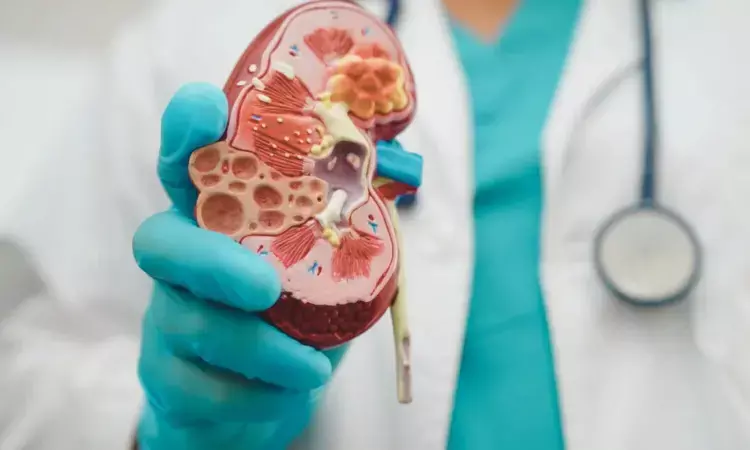- Home
- Medical news & Guidelines
- Anesthesiology
- Cardiology and CTVS
- Critical Care
- Dentistry
- Dermatology
- Diabetes and Endocrinology
- ENT
- Gastroenterology
- Medicine
- Nephrology
- Neurology
- Obstretics-Gynaecology
- Oncology
- Ophthalmology
- Orthopaedics
- Pediatrics-Neonatology
- Psychiatry
- Pulmonology
- Radiology
- Surgery
- Urology
- Laboratory Medicine
- Diet
- Nursing
- Paramedical
- Physiotherapy
- Health news
- Fact Check
- Bone Health Fact Check
- Brain Health Fact Check
- Cancer Related Fact Check
- Child Care Fact Check
- Dental and oral health fact check
- Diabetes and metabolic health fact check
- Diet and Nutrition Fact Check
- Eye and ENT Care Fact Check
- Fitness fact check
- Gut health fact check
- Heart health fact check
- Kidney health fact check
- Medical education fact check
- Men's health fact check
- Respiratory fact check
- Skin and hair care fact check
- Vaccine and Immunization fact check
- Women's health fact check
- AYUSH
- State News
- Andaman and Nicobar Islands
- Andhra Pradesh
- Arunachal Pradesh
- Assam
- Bihar
- Chandigarh
- Chattisgarh
- Dadra and Nagar Haveli
- Daman and Diu
- Delhi
- Goa
- Gujarat
- Haryana
- Himachal Pradesh
- Jammu & Kashmir
- Jharkhand
- Karnataka
- Kerala
- Ladakh
- Lakshadweep
- Madhya Pradesh
- Maharashtra
- Manipur
- Meghalaya
- Mizoram
- Nagaland
- Odisha
- Puducherry
- Punjab
- Rajasthan
- Sikkim
- Tamil Nadu
- Telangana
- Tripura
- Uttar Pradesh
- Uttrakhand
- West Bengal
- Medical Education
- Industry
How novel antibody felzartamab impacts IgA nephropathy?

IgA nephropathy (IgAN) is an autoimmune kidney disease driven by immune cells that express a protein called CD38 on their surface. A recent Phase 2 trial revealed that felzartamab, an investigational anti-CD38 monoclonal antibody, helps to reduce proteinuria and maintain patients’ kidney function. Investigators evaluated the molecular mechanisms underlying felzartamab’s potential efficacy in IgAN. The findings will be presented at ASN Kidney Week 2024 October 23– 27.
It is hypothesized that CD38+ cells contribute to disease through the secretion of galactose-deficient IgA1 (Gd-IgA1) as well as anti-Gd-IgA1 antibodies, which subsequently form immune complexes that deposit in the kidneys and cause inflammation and downstream loss of kidney function.
In their analysis, researchers examined whole-blood and serum collected from patients with IgAN before, during, and after felzartamab treatment. Samples were assessed for immune cells, antibodies, and immunoglobulins including Gd-IgA1.
The analyses revealed that felzartamab induced rapid and durable depletion of Gd-IgA1 and total IgA antibodies. Patients who received 9 doses over a 6-month treatment period maintained Gd-IgA1 reduction for up to 9 months off-treatment. In addition, total IgA reduction was maintained for at least 18 months off-treatment. In contrast, the body’s total IgG antibody titers were modestly reduced and recovered within 4 months off-treatment, suggesting the preservation of components of the body’s adaptive immune response.
“These data further our understanding of the role of CD38+ antibody secreting cells in IgA nephropathy pathogenesis,” said corresponding author Millie Shah, PhD, Senior Scientist at Biogen. “By directly depleting these cells, felzartamab reduces the cellular drivers of disease and has the potential for durable clinical benefit without continuous dosing, potentially lowering patient burden and offering improved tolerability.”
Study: “Felzartamab durably reduces disease relevant biomarkers through targeting of CD38+ plasma cells and plasmablasts, the upstream drivers of IgA nephropathy (IgAN)”
Reference:
How the novel antibody felzartamab impacts IgA nephropathy, American Society of Nephrology, Meeting: ASN Kidney Week 2024.
Dr Kamal Kant Kohli-MBBS, DTCD- a chest specialist with more than 30 years of practice and a flair for writing clinical articles, Dr Kamal Kant Kohli joined Medical Dialogues as a Chief Editor of Medical News. Besides writing articles, as an editor, he proofreads and verifies all the medical content published on Medical Dialogues including those coming from journals, studies,medical conferences,guidelines etc. Email: drkohli@medicaldialogues.in. Contact no. 011-43720751


